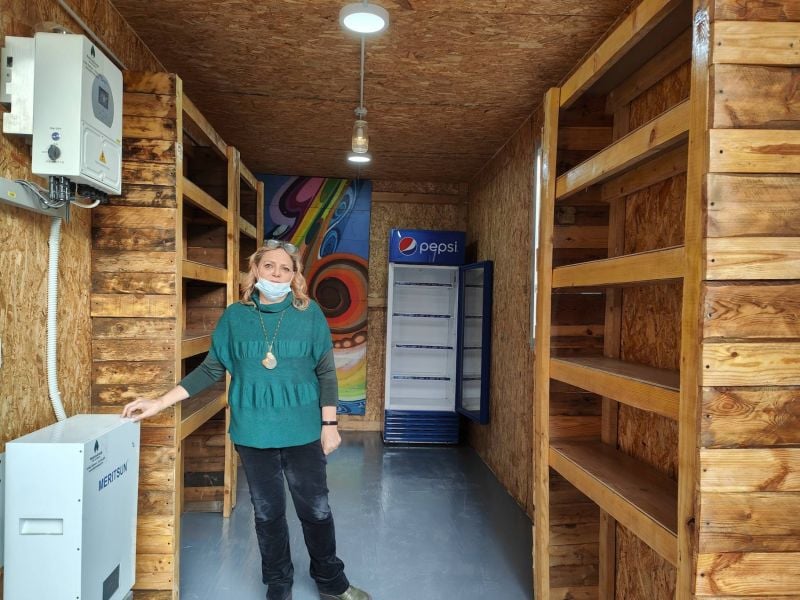
Imane Assaf, head of Ahla Fawda, in the NGO's planned grocery store. (Credit: Laure Delacloche)
BEIRUT — When aid NGO Teta w Jeddo was first founded in 2020 — shortly after the Beirut port blast — it relied on private donors for funding. That money helped provide food relief and visits for 150 underprivileged elderly people.
But it’s now been nearly four years since international attention poured into post-blast aid efforts, and that means less money coming from donors. “Some of them decreased their donations, citing the war in Armenia and in Ukraine,” Father Guillaume Bruté de Rémur, president and member of the supervisory board of Teta w Jeddo, says.
As of January 2024, it has received enough funding to ensure the continuation of its operations until June.
“However these fundings always come with a drawback: they are temporary,” Bruté de Rémur says.
That’s why Teta w Jeddo is part of a growing number of Lebanese NGOs looking to shift into social enterprises — in other words, they’ll provide paid services and products and use the profits to provide social services. They still need about $70,000, but the eventual hope: to become financially independent from private donors, and in the best-case scenario, entirely independent from external funding.
The option is far more sustainable than relying on donors, NGO leaders tell L’Orient Today.
Bruté de Rémur’s main idea to bring in some income is to launch a non-profit service of personal assistants for the elderly.
“Lebanese are ready to pay for professional assistance to their parents and grandparents, especially when they live abroad. I want to create this profession in Lebanon, thereby ennobling domestic work and providing a fair alternative to the kafala system,” he explains. The generated profits would, in turn, support Teta w Jeddo’s food relief activity and personal assistance service to elderly people who cannot afford them.
“The key to starting this project is to receive funding to develop it,” Bruté de Rémur is currently awaiting responses to different proposals on this front.
‘Beautiful chaos’
This first step was successfully taken by Ahla Fawda (“Beautiful Chaos”), which received $70,000 through grants, private sector and private donations to start a recycling facility to sustain its food relief operations. Located in Hamra, Ahla Fawda “feeds 30 families per week” says Imane Assaf, head of Ahla Fawda, and organizes cultural and environmental activities.
“Since September 2022, we have been asking [the families] to bring a certain amount of recyclables in exchange for a food box, which fosters a culture of environmental responsibility.”
Last May, the NGO started an “eco-hub” on a piece of land that was given to them in the heart of Hamra — since then, they have upcycled several shipping containers into a grocery store, educational center and waste sorting facility.
In the eco-hub, the waste will be turned into a currency: depending on what the beneficiaries bring, “they will be invited to select items they need from a range of products: food, clothes, books, etc.”
The waste will be sorted by ReFuse, another social enterprise promoting a zero-waste approach. This partner organization will then sell the recyclables to private companies and will remunerate Ahla Fawda accordingly.
“In December 2023, we collected 2.5 tons of recyclables, which covers the costs of six to seven food parcels,” Assaf says. Aware that beneficiaries will not be able to gather enough recyclables to cover the costs of their own needs, she says Ahla Fawda has turned to local pubs, businesses and one hospital who now give the NGO their recyclables.
She anticipates that this activity, as well as workshops and events, will contribute to Ahla Fawda’s budget, which amounted to $250,000 in 2023, and thus will help sustain the food relief operations.
A long-term solution?
The process is costly, but “it is a long-term solution,” Assaf believes. “I cannot depend on donors. We have to stand on our own two feet, be sustainable and empower our community — receiving can also be a trap for dignity,” she stresses.
She also points out the complexities of responding to calls for proposals, and “the high competition among local NGOs” to access funding.
Imane Assaf admits with a smile that she started this social enterprise “without knowing that it was called like this.”
“There is no legal definition of a social enterprise in Lebanon,” says Alain Daou, Dean of the Faculty of Business at the American University of Beirut’s Cyprus campus. In general, though, what differs such organizations from typical NGOs is that “a social enterprise has to pursue a social or environmental mission which should be at the core of the business model, and has to be as self-sufficient as possible.”
Daou, who researched and published several academic papers on the topic, stresses that “most social enterprises fail because there is no long-term investment in them.”
Instability in Lebanon
For now, however, there is some success.
Alain Daou estimates that there now are at most 200 social enterprises in Lebanon that have survived past the three-year mark.
“I think we've found our solution, and I would encourage all the NGOs in Lebanon to do the same!” Maya Ibrahimchah, founder of the relief organization Beit El Baraka, gushes. She’s sitting on a comfortable sofa in the NGO’s Beit Kanz restaurant.
Imbrahimchah founded Beit El Baraka in 2019 as a food relief organization for the elderly. For some years, this NGO was primarily relying on donations from the Lebanese diaspora in the United States. In 2023, expatriates were still covering 80 percent of the annual budget, she says, amounting to $5 million.
“The diaspora contributed a lot, however, they also have to provide for their family in Lebanon: they are not able to give as much anymore.”
That’s why she started Kanz, a social enterprise, in late 2021. It produces Lebanese traditional mouneh, as well as other crafts. Beit Kanz restaurant, the flagship business of Kanz, opened in October 2022.
By the end of 2022, Kanz was able to transfer 100 percent of its profits to Beit el Baraka, amounting to $50,000. “We are projecting that we will need three years for Kanz’s profit to cover our NGOs’ running costs, which amounts, for 2023, to $500 000,” Ibrahimchah projects.
While extremely enthusiastic, she realizes that the unstable security situation in Lebanon is a threat to her funding model. “Until October, the financial reserve to be sent to Beit el Baraka for 2023 amounted to $300,000. Unfortunately, when the war started in Gaza, the restaurant and the two Kanz shops were completely emptied, until mid-November, leading to an important loss of revenue. We had to use part of the reserve to cover the salaries, electricity and fuel, the VAT… in addition to having to throw away large amounts of food. We are now left with $122,000 in reserve.”
Despite the challenges, the founder-turned-social entrepreneur says that “we cannot always anticipate another crisis or another war. When we opened the restaurant in 2022, everyone told me that the timing was poor. And yet it works!”
